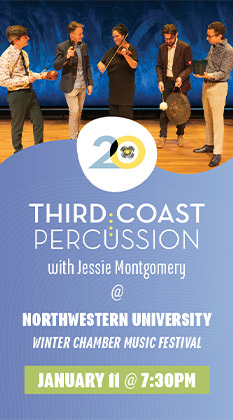St. Olaf Choir shows adventurous spirit in wide-ranging program
If anyone thinks that the American college choir tradition is no longer what it once was, let them come to Northfield, Minnesota.
Founded in 1911, the St. Olaf Choir has a storied history, reflecting the strong musical emphasis of the college that is its home. With eight choirs, two bands, two full symphony orchestras and more than a dozen smaller ensembles, one-third of St. Olaf College’s 3,000 students take part in musical events. The choir has been a national presence for more than eight decades, with touring an essential part of its mission from the earliest years.
The St. Olaf Choir made one of its last stops on a month-long national tour Friday night at Trinity Christian College in Palos Heights before heading home to Minnesota.
The rigorous travel of the last few weeks seemed to have little effect on the 75 young singers. Under the exacting direction of conductor Anton Armstrong, the choir showed enviable cohesion, accurate intonation and impressive flexibility with a high tenorial center of gravity. Also striking was their relaxed physical presence, the singers swaying freely to the music.
On the eve of its centennial year, the St. Olaf Choir displayed its superb training in the opening set with evenly blended vocalism in Handel’s With the Voice of Praise (from Chandos Anthem No. 6), pure corporate tone in Tallis’s If Ye Love Me and bringing a joyous lilt and impressive stamina to Bach’s extended Fürchte dich nicht from Cantata No. 228.
St. Olaf’s is a Lutheran college with a religious emphasis, yet Armstrong has expanded the choir’s repertoire over his decade of leadership, and Friday’s adventurous and ecumenical program went far beyond Amazing Grace and familiar hymns.
The singers’ linguistic versatility was impressive in a set of international praise ranging from Schumann’s exotic motet Talismane, to Louis Lewandowski’s febrile Brahmsian Hebrew setting, Enosh, and a lovely Praise to the Lord arrangement by the choir’s founder. F. Melius Christiansen.
Yet the most striking setting came from the pen of 29-year-old composer, Abbie Betinis. A St. Olaf alum (2001) from Stevens Point Wisconsin, Betinis’ Persian setting of Bar Xizam (Upward I Rise) proved an audacious tour de force, with vaulting muezzin-like solos, shifting textures, and rapidly soaring accelerandos reflecting the exultation of the text. This is extraordinary music by a greatly gifted young composer and under Armstrong’s scrupulous direction, the choir overcame the myriad challenges to give Betinis’s work sterling advocacy.
The singers also displayed tonal polish and clear articulation in an ardent account of Finzi’s All This Night and Ola Gjeilo’s attractive, retro-Anglican Ubi Caritas. The solo voices in Ralph M. Johnson’s This House of Peace, however, could have been more firmly projected to give better clarity to this touching setting of patients’ words, commissioned for an Oregon hospital.
The choir’s present compositional talent was represented by second-year member Stanford Scriven’s radiant arrangement of Jesus Christ the Apple Tree, with luminous vocalism by the sopranos. A nimble 12-member chamber orchestra from St. Olaf’s provided worthy support throughout the evening.
Posted in Performances




Posted Feb 15, 2010 at 12:48 pm by Ken
St. Olaf is the best-kept secret among American colleges. If I were 18 again, I would choose it over any (and I mean ANY) other college. The people who do college rankings should be asking themselves why St. Olaf ranks lower than colleges that offer so much less.